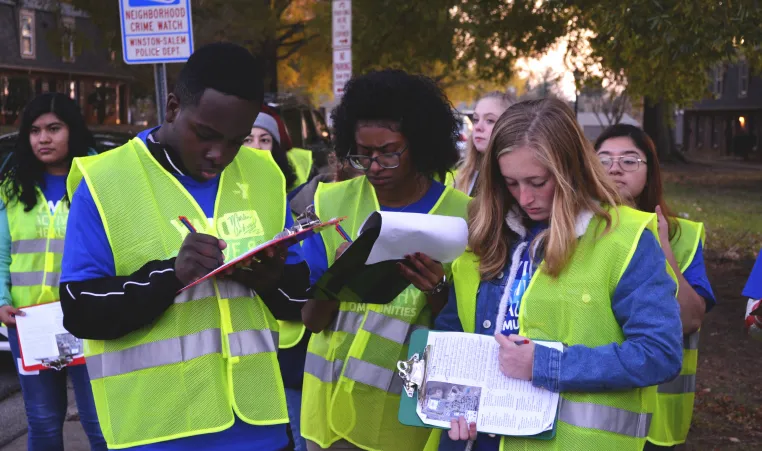
In November 2019, 15 students from the Parkland High School Youth & Government delegation in Winston-Salem conducted a walk audit around their high school to assess how safe it is to walk or bike to their school and in the surrounding community, and to share their findings and recommendations with local policymakers. Their findings were rather disheartening, according to Rain Thoresen, Youth & Government program coordinator at the William G. White, Jr. Family YMCA, part of the YMCA of Northwest North Carolina.
Thoresen had attended training earlier in November about how to conduct walk audits to build community engagement at the NC Bike Walk Summit. The NC Alliance of YMCAs provided funding for the training as part of its YUSA Active and Healthy Communities Grant.
The student leaders chose their audit site because it’s a densely populated area that includes the high school, residential areas, a grocery store, a major highway with essential bus stops, a library and restaurants. Many of the students had a story of a friend who had nearly been hit in the area, and that some people have actually been in pedestrian crashes.
"The concern for our peers grew, and we began to look at what was good about the route and what improvements could be made to provide a more safe and practical commute to and from school, “ said Lloyd Mann, a senior at Parkland High School.
After a 30-minute briefing and armed with their walk audit forms, the students conducted their audit for about an hour, and then returned to the classroom to make notes on recommendations for short- and long-term improvements for walkability. Thoresen shared some of the findings:
- There was not a single crosswalk connecting to the school, park, or library. There is a short path through the woods that is the safest way for students to get from school to the library and other residential areas, however, the path has "no trespassing" signs on it.
- There is not a fully connected sidewalk that leads from the bus stop to the school or any of the other areas mentioned.
- Many students identified the crosswalk on Peters Creek Parkway as the single biggest issue. The crosswalk is not very visible, and many students didn't even realize it was a crosswalk. There is no signal to indicate when walkers can cross, and walkers have to stop in the median on this highly travelled, 45-mph highway to be able to cross. This intersection touches the school property.
- While the students conducted the audit, they saw cross country team runners walking very close to the road where there was no sidewalk; this situation is not unusual around the school property.
Despite a number of serious concerns, the students did note some positives.
- a bike lane near the library ,
- a great sidewalk in the residential area,
- pedestrian lighting, and
- signage in Spanish and English
“For me, the most positive part was when one of the students gained a new perspective. She shared that she always thought people who cross Peter's Creek Parkway were ‘stupid,” but she said she now realizes that a lot of people don't have a choice but to walk where they need to go. Beyond that, she gained the understanding that they have the right to as well,” Thoresen said.
The students met again in mid-December to talk further about their findings and talked about best practices for writing letters to elected officials. All of the students are writing letters to their Winston-City Council representative, as well as their NC General Assembly representative.
“The specific goal of our walk audit was to have students make recommendations to policymakers on how to make their community a safer place to walk and bike in,” Thoresen said. “The broader impact, however, is allowing students the opportunity to advocate for their community. Youth and Government takes pride in empowering students to identify community issues and take action to create change. This effort, in particular, pushed students to see the world from a different perspective."
(Dec. 19, 2019)